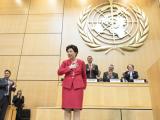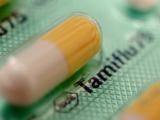Judge rejects bid to ban use of some H1N1 vaccines in pregnant women
A federal judge yesterday rejected an advocacy group's request to bar the government from using thimerosal-containing H1N1 flu vaccines in pregnant women, the Washington Post said. The group argued that thimerosal could harm fetuses. But a judge in Washington said the group couldn't prove that pregnant women would get shots containing thimerosal. Most flu vaccines contain it, but the CDC has said it plans to supply enough thimersoal-free H1N1 vaccine for pregnant women and young children.
Chicago H1N1 study shows children far more susceptible than older adults
A study of the first 3 months of the H1N1 flu epidemic in Chicago shows that children aged 5 to 14 were 14 times more susceptible to the virus than adults aged 60 and older, according to Morbidity and Mortality Weekly Report (MMWR). Chicago had 1,557 confirmed cases during the 3 months, and the attack rate for children was 147 per 100,000 population. The hospitalization rate was highest for children 0 to 4 years old (25 per 100,000), followed by those aged 5 to 14 (11 per 100,000).
http://www.cdc.gov/mmwr/preview/mmwrhtml/mm5833a1.htm?s_cid=mm5833a1_e
Aug 29 MMWR article
Federal workers may be allowed to use sick leave to care for ailing relatives
Under a new proposal, federal employees could use accumulated sick leave to care for family members sick with H1N1 flu or other infectious diseases, the Washington Post reported. The proposal, published yesterday, would allow workers to use up to 13 days of sick leave to care for a relative before getting a doctor's determination that the relative had an infectious disease. With the doctor's determination, the employee could use up to 12 weeks of sick leave a year.
http://www.washingtonpost.com/wp-dyn/content/article/2009/08/26/AR2009082603604.html
Aug 27 Washington Post story
Liability, insurance coverage threaten Australia's vaccine program
Australia's pandemic H1N1 vaccine campaign is in peril because the government has refused to indemnify physicians who administer the vaccine and because insurance companies seem unwilling to pay doctors to deliver the vaccines, the Sydney Morning Herald reported today. Insurance companies have also raised concerns about multidose vial safety and a lack of vaccine safety data. The country's vaccine campaign is slated to start in mid September, with enough vaccine to cover half of the population.
http://www.smh.com.au/national/swine-flu-vaccine-plan-in-disarray-20090827-f17x.html
Aug 27 Sydney Morning Herald story
New Zealand's medical visit rate for flu-like illness tripled this year
Flu surveillance in New Zealand from early May to early August showed that the peak in weekly visits to general practitioners for flu-like illness was the highest since 1997 and three times as high as in 2008, according to MMWR. Surveillance also showed that as the season progressed, the number of 2009 H1N1 isolates rapidly exceeded the number of seasonal flu isolates, with the new strain making up 80% of all weekly isolates by early July.
Aug 29 MMWR article
http://www.cdc.gov/mmwr/preview/mmwrhtml/mm5833a2.htm?s_cid=mm5833a2_e
Brazil reports world's highest H1N1 flu death toll at 557
Brazil has displaced the United States as the country with the most 2009 H1N1 flu deaths, at 557, Agence France-Presse reported yesterday. The latest official death toll for the United States was 522 as reported by the CDC last week. Brazil's health ministry said the country's H1N1 epidemic appears to be declining. The ministry has allocated $1 billion to buy 73 million doses of H1N1 vaccine, along with oseltamivir, hospital equipment, and diagnostic tests.
Defense Department secures its own vaccine supply
The US Department of Defense has purchased a 2.7 million–dose supply of novel H1N1 vaccine for active military members through the federal government and will launch immunization campaigns in October, starting with high-risk groups and those who live in close quarters at sea, Government Executive reported yesterday. All service members are slated to receive the vaccine, though their dependents will receive theirs though civilian channels.
http://www.govexec.com/ads/welcome/?rf=http://www.govexec.com/story_page.cfm?articleid=43475&dcn=e_gvet
Aug 26 Government Executive story
South Korea rolls out strict school flu measures
South Korea's education ministry yesterday announced strict measures to curb the spread of the pandemic H1N1 virus, including checking all students' temperatures each day, sterilizing classrooms daily, and refraining from group activities, Agence France-Presse reported today. So far 46 schools have closed or delayed the start of fall classes. The government expects to place school children on its vaccine priority list.
http://timesofindia.indiatimes.com/NEWS/World/Rest-of-World/All-South-Korean-students-face-swine-flu-check-/articleshow/4941249.cms
Aug 27 AFP story



















